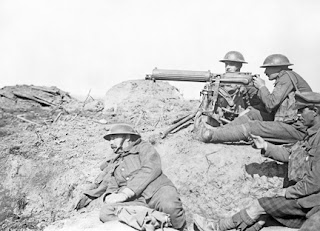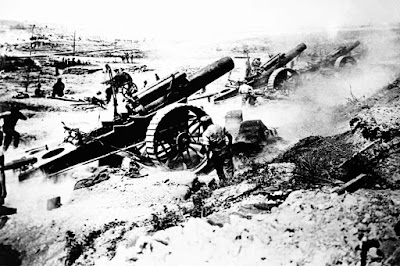World
War I (1914-18)
World War I (1914-18) was the first catastrophic war to be fought
globally. In this, almost all the influential nations of the world took part.
This war happened between the Allies (England, France, Russia, the United
States, Italy, Romania and allied nations) and central powers (Germany, Austria
- Hungary, Turkey, and Bulgaria etc.). The conquest of the Allies and the
defeat of the Central Powers in the First World War.
Reasons of World War I
European power - deterioration of balance-
Germany did not have an important role in European politics
prior to the integration of Germany in 1871, but the emergence of a powerful
German nation led by Bismarck. From this the European power - balance was
disturbed. Germany became a challenge for England and France. This increased
the sense of competitiveness among the European nations.
Creation of
Secret Sandals and Clans-
After the integration of Germany, Chancellor Bismarck
adopted the policies of secret treaties to make his country influential in
European politics and to keep France in the politics of Europe uninterrupted.
He made the Dual Alliance with Austria-Hungary (1879). Friendship treaty was
also done with Russia (1881 and 1887). Bismarck also made friendly ties with
England. In 1882, he made a treaty of friendship with Italy and Austria. As a
result, a new faction was formed in Europe called the Triple Alliance. It
included Germany, Austria-Hungary and Italy. England and France remain separate
from this faction.
 Germany and
France hostility-
Germany and
France hostility-
There was an old hostility between Germany and France.
During the unification of Germany, Bismarck had taken over the wealthy
France-Alsace-Lauren. French interests were also damaged in Morocco. This was
against France's referendum. France always kept trying to undermine Germany.
Germany, on the other hand, wanted to keep France as powerless. Therefore,
Germany made a three-point agreement to keep France as non-existent. In return
France also formed a group of its allies against Germany. By the time of World
War I, the enmity of Germany and France had increased so much that it made the
war inevitable.
Imperialist competition-
Conflicts of mutual rivalries and interests for the empire
expansion of imperialist countries can be considered as the root cause of World
War I.
To run tomorrow-factories due to the Industrial Revolution,
market needs to be consumed for consumption of raw materials and items produced
in factories. As a result, the imperialist powers England France and Russia had
made their colonies in Asia and Africa and took possession of them.
Germany and Italy, when the colonists later joined the race,
there was little possibility for their expansion. So these countries adopted a
new policy of colonial expansion. This policy was forcibly exercising authority
over the other colonies of other nations to strengthen their position.
Until the beginning of World War I, Germany's economic and
industrial position had become very strong. Therefore, the German emperor got
anxious to get the proper place on earth and under the sun. His army was strong
and now he started building a strong fleet and trying to challenge the
development of his kingdom and ownership of the sea in England.
As a result of the Anglo-German navigator competition in
1911, Agadir's crisis arose. An attempt was made to resolve this, but it
failed. In 1912, a huge ship immaculator was built in Germany, which was the
largest ship at that time. False: Enragedness and competition increased in
Germany and England.
Similarly, Morocco and Bosnia crisis promoted the
competition of England and Germany.
To increase its influence area, when France created the
Werleen Baghdad Rail Road, with the aim of controlling the economy of the
decadent Turkish Empire, England France and Russia opposed it. This increased
bitterness.
Militarism-
Militarism similar to imperialism also brought the First
World War closer. In order to implement its security and expansionist policy,
each nation has been engaged in the manufacture and purchase of arms and
ammunition. To protect its own colonies, it became necessary to be strong from
the military standpoint. Consequently, new weapons and ammunition were made. A
large part of the national income started to be spent on the construction of
arms and weapons on the military organization. France, for example France and
other major nations were spending 85% of their income on military systems.
Compulsory military service was introduced in many countries. The number of
soldiers was greatly increased. Military officers dominated the country's
politics. Thus, Europe sat down on a pile of ammunition. The blast was delayed
in 1914.
Fierce nationalism-
Aggressive or distorted nationalism also became a
fundamental cause of World War I.
It has a similar development in all the European countries. This
feeling grew rapidly that if people of common caste, religion, language, and
historical traditions meet together and works together, they will be separated
and their progress will be progressive.
Earlier on this basis, Germany and Italy had been unified on
this basis. This sentiment was strong in the Balkan region. The Balkan region
was under the Turkish Empire. On the weakening of the Turkish Empire, the
demand for freedom in this area began to catch up. In many areas of the Turkish
Empire and Austria, Hungary, there was a large majority of Slavic people. They
were demanding a different Slavic nation.
Russia believed that after independence from Austria-Hungary
and Turkey, Slav would be under the influence of Russia. Therefore, the
Russians promoted the All-Slav or Saraswāvāvā movement. Russia and Austria -
Hungary have bitter relations with it.
Similarly, the Sarva Jarman movement was also
run. People of all, check and pole species were also seeking freedom. This
increased the sense of bitterness in European nations.
Lack of international institution-
Before World War I there was no such institution that
imperialism maintained cordial relations between different nations by
controlling militarism and fierce nationalism. Each nation was independently
making its arbitrariness, in Europe, a kind of chaotic situation prevailed in
Europe.
Poll and news paper-
The then public opinion for the First World War was also not
less responsive. Politicians and writers of each country were advocating war in
their articles. The bourgeoisie also became the supporter of the war in its own
interest; the most important role in the preparation of war-related opinion was
from the newspapers. The newspaper of each country used to publish false and
provocative articles against the other nation. This caused bitterness in
various nations and the people there. The false propaganda of newspapers made
the war inaccessible by poisoning Europe's atmosphere.
Reasons of that time
The immediate cause of World War I was the murder of Prince
of Austria Duke Francis Ferdinand of Bosnia in the capital of Sarajevo. On June
28, 1914, a Bosnian man of the All-Known Alliance of Black Hand, a terrorist
organization shot Rajkumar and his wife dead. This made Sarah Europe stunned
Austria considered Serbia as responsible for this incident. Austria threatened
Serbia to clarify the situation and repress the terrorists within 48 hours.
Serbia rejected the demands of Austria. As a result, on July 28, 1914, Austria
declared war against Serbia. With this, other nations also joined the war in support
of their own factions. Thus, World War I started.
First World War Responsibility
It is difficult to determine who was responsible for the First
World War None of the parties involved in the war believed in itself as a
liability for the war. In contrast, all of them argued that they tried to
maintain peace, but the war was due to the policies of the enemy nation. In one
section of the Treaty of Versailles, it was mentioned that the war was
responsible for Germany and its allies. It was a one-sided decision of the
Allies.
 In fact, all nations were responsible for World War I only
Germany was not the answer for this. Serbia started the war by rejecting
Austrian's legitimate demands. Austria announced the war and forced Russia to
take military action.
In fact, all nations were responsible for World War I only
Germany was not the answer for this. Serbia started the war by rejecting
Austrian's legitimate demands. Austria announced the war and forced Russia to
take military action.
Russia too hurried to Serbia's question Contrary to
resolving the problem of Serbia at a diplomatic level; he decided to resolve it
through military proceedings. Germany's compulsion was that it could not have
left its ally with Austria. Russia, France and England were the fierce enemies
of Germany. Germany could not remain quiet when Russia launched military
action.
It was necessary for him to take control of France and
Russia. France did not try to stop Russia from its side. On the contrary, they
assured full support to Russia in the anti-Austria campaign. From this, a small
nation like Serbia was ready to fight against Austria, Germany.
England did not take any concrete steps to avoid war
situation. He did not ask his allies to separate from the war. Consequently,
both groups joined the nation's war. No one could guess that a small war would
result in World War.
Thus, all the nations were responsible for World War I for
which no one nation can be considered responsible.
Major events of World War I
Initial phase of the war
The war broke out on July 28, 1914 as Austria declared war
on Serbia. Russia supported Serbia and Germany started military action in
support of Austria. In support of Russia, England and France came. Japan also
declared war on Germany. German army crushed Belgium near Paris's capital
Paris. At the same time, Russian invasion took place in Germany and Austria.
This led Germany to send a detachment of its army to stop the spread of Russia
on the eastern front. With France it was safe and the city of Paris survived.
In West Asia there were campaigns against Turkey and Germany in Palestine,
Mesopotamia and Arab nations. In the Far East, Japan took over the German
occupied territories. England and France took control of most German colonies
in Africa.
War in the United States
By 1917, the United States sympathized with the Allies,
remained firm in the war. In 1915, a British ship from Germany submerged
Lusitania, which also used to pass American passengers. America could not stay
calm after this incident. He announced the war against Germany on April 6,
1917. The war diverged by the United States joining the war.
Separation of the Soviet Union from War-
Where America joined the war in 1917, the Soviet Union
separated from the war. After the Bolshevik Revolution of 1917, the Lenin-led
government decided to separate from the war. The Soviet Union signed a treaty
with Germany and separated from the war.
Critical phase of war-
America joined World War I in April 1917 simultaneously; the
cycle of progress has gone faster. The defeat of the Central Powers and the
series of victory of Allies began. By force, Turkey and Austria surrendered in
October-November 1918 respectively. Germany fell alone Defeat in war and
financial crisis led to rebellion in Germany. In this situation, the German
Emperor Caesar William II had to abandon the throne. He ran away to Holland. In
Germany, the Weimar Republic was established. The new government signed the
Ceasefire Declaration on November 11, 1918. Along with this, the disastrous
First World War ended.



ConversionConversion EmoticonEmoticon